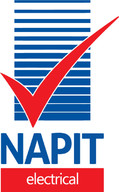4: Consumer Unit Upgrades
A popular deceit practiced by unscrupulous practitioners consists of convincing householders that existing fuse-box(es) or consumer unit(s) must be replaced by newer split-load variants in order to comply with current regulations. However, changing a consumer unit can be an extremely expensive proposition with some firms charging in excess of £800 for this service. So is this action always necessary and what might you get for your money?
Typically, a split-consumer unit, more commonly called a 17th edition board, comprises a main isolator that simultaneously supplies electrical energy to 2 x 30mA RCDs. The RCDs provide earth fault protection for the entire electrical system and in turn supply power to 2 x respective assemblies of MCBs. The MCBs protect individual circuits against overload in much the same manner as older re-wirable fuses.
The split-board is so designed that in the event of an earth fault only one of the RCDs should trip and consequently only those circuits supplied by this device would experience power loss. The idea is that in such a circumstance you’d still have power to half your house.
Our advice: Whilst split-consumer units provide a convenient form of fault protection BS 7671 does not insist that you replace serviceable fuse-boards or consumer units with varieties that incorporate dual RCDs. Indeed, many installations adopt a blanket-type protection whereby a single RCD protects the entire installation. Moreover, an RCD may be an integral component of the consumer unit or alternatively may be externally housed to the circuits it protects. In practice this means that an external RCD can often be easily retro-fitted without the need to upgrade the fuse-box/consumer unit. In other cases circuits or appliances may be individually protected either by an integral or plug-in type RCBO - a device that provides both overload and earth fault protection for individual circuits. However, some items of equipment require a functional earth in their normal operation and thus cannot be connected to an RCD protected circuit but should instead be supplied via independent high-integrity circuits. In addition, other factors such as system earthing arrangements and zoning must also be considered when determining appropriate earth fault protection.
Given the various considerations that must be taken into account we would strongly recommend you get a second opinion from a CPS installer before committing to a consumer unit upgrade. Reputable electricians should have no problem with this requirement as their advice will be knowledge-based and as such will stand the independent scrutiny of qualified fellow professionals.
Cowboys Kill - Gallery 2
Reading The Trail
Listed below are some of the warning signs to look out for when employing an electrician to work on your property.
Very cheap quotes and estimates – often indicates sub-standard workmanship and the use of non-compliant equipment, fixtures and fittings, which can result in electrical shock and fires.
A resolute unwillingness to put a quote or estimate in writing - often indicates no intention of sticking to an agreed price. Back of envelope pricing invariably leads to exorbitant hidden costs and extras.
Unable to offer references – often indicates a poor trading record and a trail of dissatisfied customers.
Incredibly keen to start the job straight away – often indicates an empty order book. Reputable electricians are normally committed to projects weeks or sometimes months in advance.
Is unwilling or unable to provide details about their business – if an electrician cannot supply a landline number and physical or website address they will likely be impossible to track down in the event that they leave sub-standard or unfinished work in their wake.
Claims to be in a trade association but doesn’t produce an identity card - always check out an electrician’s credentials. If they don’t belong to the trade association claimed they’re dishonest and committing a criminal offence
Claims to work for a company with a good reputation- always confirm their employment status. If they’re misrepresenting don’t use them.
Doesn’t offer you a contract, or will not sign the one you provide - rogues operate outside the law. Avoid!
Asks for money up front - reputable electricians don’t do this. If they run a business, they should have enough money to cover the initial project outlay and only ask for payment at pre-agreed stages of the contract when materials have been supplied, or a reasonable amount of work has been done, or the job is satisfactorily completed and the necessary certification is issued.
Provides a detailed quotation and schedule of work but doesn’t follow it – often indicates that shortcuts are being taken or that a bill will be loaded with extras. Ask for a written explanation outlining the need for any changes alongside a guarantee that the quoted price remains in force. If you’re still unsatisfied insist on a second opinion from a scheme registered electrician.
Doesn’t charge VAT – legitimate small or new traders may not need to register for VAT dependent upon how much work they do in a year and whether they cross the VAT threshold. If they should be registered, they could be avoiding charging VAT to artificially lower their prices thus giving themselves an unfair competitive edge. This is dishonest and against the law.
Only accepts cash – often indicates the recipient may be acting dishonestly by not paying taxes.
Tips To Enforce Transparency
- Be specific about your project setting out a detailed, clear brief of the work to be done. Get three quotes from reputable scheme-registered electricians.
- Only use firms that advertise landline phone numbers and websites and be very wary of those only willing to give you a mobile number.
- Seek references and contact previous customers.
- Don't automatically go with the cheapest quote but also consider your ability to communicate with the firm and the quality of their work.
- Only pay for work that has been done and not by advance payments. However, if materials need to be bought in advance by the tradesman, it is reasonable that the customer is asked to pay a fair percentage of these costs as the job progresses.
- Ensure that any changes to the agreed contract value are made in writing prior to such additional works being undertaken.
























